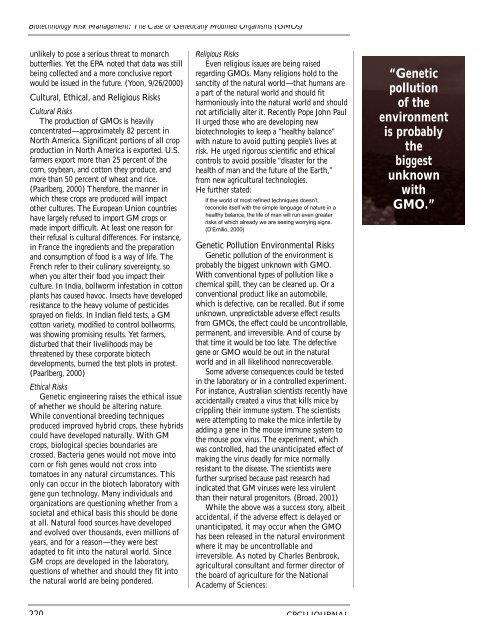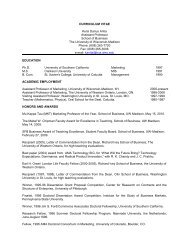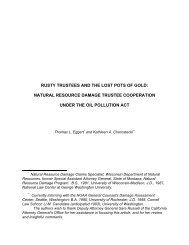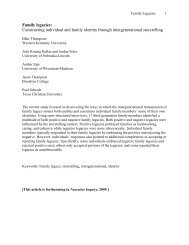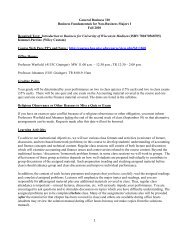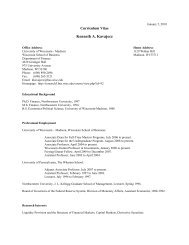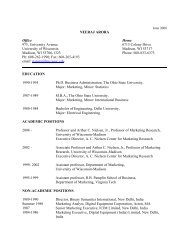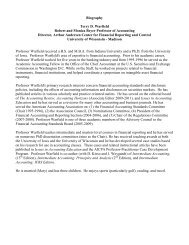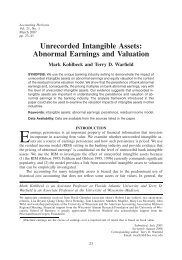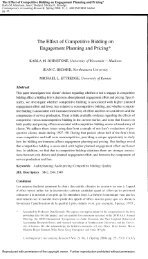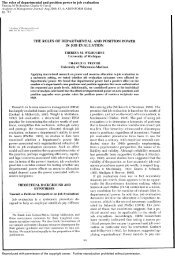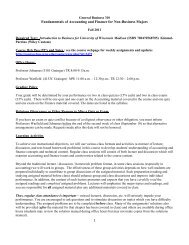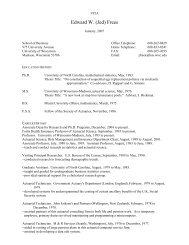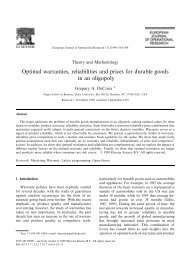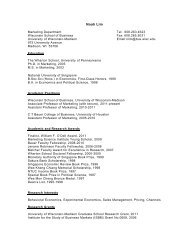by Dan R. Anderson, Ph.D.,CPCU - Wisconsin School of Business ...
by Dan R. Anderson, Ph.D.,CPCU - Wisconsin School of Business ...
by Dan R. Anderson, Ph.D.,CPCU - Wisconsin School of Business ...
You also want an ePaper? Increase the reach of your titles
YUMPU automatically turns print PDFs into web optimized ePapers that Google loves.
Biotechnology Risk Management: The Case <strong>of</strong> Genetically Modified Organisms (GMOs)<br />
unlikely to pose a serious threat to monarc h<br />
b u t t e rflies. Yet the EPA noted that data was still<br />
being collected and a more conclusive re p o rt<br />
would be issued in the future. (Yoon, 9/26/2000)<br />
Cultural, Ethical, and Religious Risks<br />
Cultural Risks<br />
The production <strong>of</strong> GMOs is heavily<br />
c o n c e n t r a t e d — a p p roximately 82 percent in<br />
N o rth America. Significant portions <strong>of</strong> all cro p<br />
p roduction in North America is exported. U.S.<br />
f a rmers export more than 25 percent <strong>of</strong> the<br />
c o rn, soybean, and cotton they produce, and<br />
m o re than 50 percent <strong>of</strong> wheat and rice.<br />
( P a a r l b e rg, 2000) There f o re, the manner in<br />
which these crops are produced will impact<br />
other cultures. The European Union countries<br />
have largely refused to import GM crops or<br />
made import difficult. At least one reason for<br />
their refusal is cultural diff e rences. For instance,<br />
in France the ingredients and the pre p a r a t i o n<br />
and consumption <strong>of</strong> food is a way <strong>of</strong> life. The<br />
F rench refer to their culinary sovere i g n t y, so<br />
when you alter their food you impact their<br />
c u l t u re. In India, bollworm infestation in cotton<br />
plants has caused havoc. Insects have developed<br />
resistance to the heavy volume <strong>of</strong> pesticides<br />
sprayed on fields. In Indian field tests, a GM<br />
cotton variety, modified to control bollworm s ,<br />
was showing promising results. Yet farm e r s ,<br />
disturbed that their livelihoods may be<br />
t h reatened <strong>by</strong> these corporate biotech<br />
developments, burned the test plots in pro t e s t .<br />
( P a a r l b e rg, 2000)<br />
Ethical Risks<br />
Genetic engineering raises the ethical issue<br />
<strong>of</strong> whether we should be altering nature.<br />
While conventional breeding techniques<br />
produced improved hybrid crops, these hybrids<br />
could have developed naturally. With GM<br />
crops, biological species boundaries are<br />
crossed. Bacteria genes would not move into<br />
corn or fish genes would not cross into<br />
tomatoes in any natural circumstances. This<br />
only can occur in the biotech laboratory with<br />
gene gun technology. Many individuals and<br />
organizations are questioning whether from a<br />
societal and ethical basis this should be done<br />
at all. Natural food sources have developed<br />
and evolved over thousands, even millions <strong>of</strong><br />
years, and for a reason—they were best<br />
adapted to fit into the natural world. Since<br />
GM crops are developed in the laboratory,<br />
questions <strong>of</strong> whether and should they fit into<br />
the natural world are being pondered.<br />
Religious Risks<br />
Even religious issues are being raised<br />
re g a rding GMOs. Many religions hold to the<br />
sanctity <strong>of</strong> the natural world—that humans are<br />
a part <strong>of</strong> the natural world and should fit<br />
h a rmoniously into the natural world and should<br />
not artificially alter it. Recently Pope John Paul<br />
II urged those who are developing new<br />
biotechnologies to keep a “healthy balance”<br />
with nature to avoid putting people’s lives at<br />
risk. He urged rigorous scientific and ethical<br />
c o n t rols to avoid possible “disaster for the<br />
health <strong>of</strong> man and the future <strong>of</strong> the Eart h , ”<br />
f rom new agricultural technologies.<br />
He further stated:<br />
If the world <strong>of</strong> most refined techniques doesn’t<br />
reconcile itself with the simple language <strong>of</strong> nature in a<br />
healthy balance, the life <strong>of</strong> man will run even greater<br />
risks <strong>of</strong> which already we are seeing worrying signs.<br />
(D’Emilio, 2000)<br />
Genetic Pollution Environmental Risks<br />
Genetic pollution <strong>of</strong> the environment is<br />
p robably the biggest unknown with GMO.<br />
With conventional types <strong>of</strong> pollution like a<br />
chemical spill, they can be cleaned up. Or a<br />
conventional product like an automobile,<br />
which is defective, can be recalled. But if some<br />
unknown, unpredictable adverse effect re s u l t s<br />
f rom GMOs, the effect could be uncontro l l a b l e ,<br />
p e rmanent, and irreversible. And <strong>of</strong> course <strong>by</strong><br />
that time it would be too late. The defective<br />
gene or GMO would be out in the natural<br />
world and in all likelihood nonrecoverable.<br />
Some adverse consequences could be tested<br />
in the laboratory or in a controlled experiment.<br />
For instance, Australian scientists recently have<br />
accidentally created a virus that kills mice <strong>by</strong><br />
crippling their immune system. The scientists<br />
w e re attempting to make the mice infertile <strong>by</strong><br />
adding a gene in the mouse immune system to<br />
the mouse pox virus. The experiment, which<br />
was controlled, had the unanticipated effect <strong>of</strong><br />
making the virus deadly for mice norm a l l y<br />
resistant to the disease. The scientists were<br />
f u rther surprised because past re s e a rch had<br />
indicated that GM viruses were less viru l e n t<br />
than their natural progenitors. (Broad, 2001)<br />
While the above was a success story, albeit<br />
accidental, if the adverse effect is delayed or<br />
unanticipated, it may occur when the GMO<br />
has been released in the natural environment<br />
where it may be uncontrollable and<br />
irreversible. As noted <strong>by</strong> Charles Benbrook,<br />
agricultural consultant and former director <strong>of</strong><br />
the board <strong>of</strong> agriculture for the National<br />
Academy <strong>of</strong> Sciences:<br />
220 <strong>CPCU</strong> JOURNAL<br />
“Genetic<br />
pollution<br />
<strong>of</strong> the<br />
environment<br />
is probably<br />
the<br />
biggest<br />
unknown<br />
with<br />
GMO.”


